The Cambridge History of Japan, Vol. 4: Early Modern Japan
Подождите немного. Документ загружается.

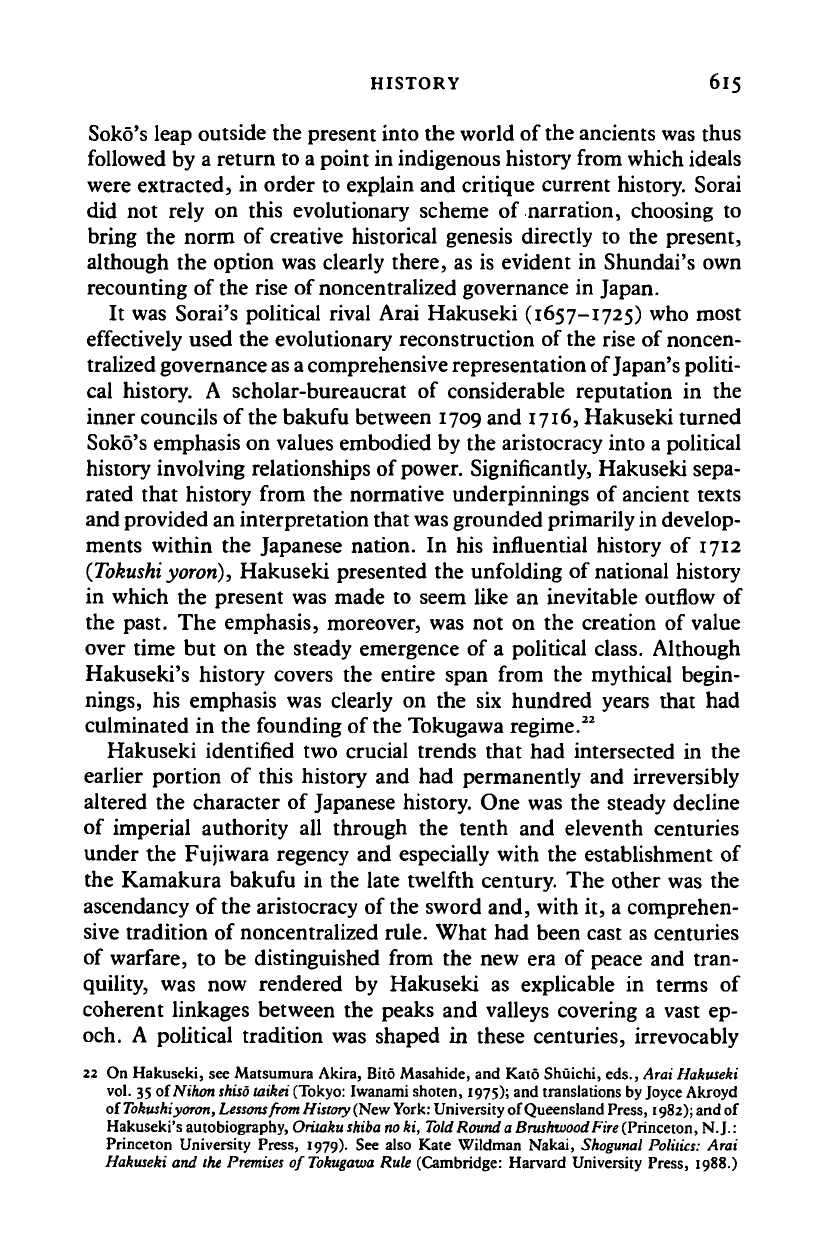
HISTORY 615
Soko's leap outside the present into the world of the ancients was thus
followed by a return to a point in indigenous history from which ideals
were extracted, in order to explain and critique current history. Sorai
did not rely on this evolutionary scheme of narration, choosing to
bring the norm of creative historical genesis directly to the present,
although the option was clearly there, as is evident in Shundai's own
recounting of the rise of noncentralized governance in Japan.
It was Sorai's political rival Arai Hakuseki (1657-1725) who most
effectively used the evolutionary reconstruction of the rise of noncen-
tralized governance
as a
comprehensive representation of Japan's politi-
cal history. A scholar-bureaucrat of considerable reputation in the
inner councils of the bakufu between 1709 and 1716, Hakuseki turned
Soko's emphasis on values embodied by the aristocracy into a political
history involving relationships of power. Significantly, Hakuseki sepa-
rated that history from the normative underpinnings of ancient texts
and provided an interpretation that was grounded primarily in develop-
ments within the Japanese nation. In his influential history of 1712
(Tokushi
yorori),
Hakuseki presented the unfolding of national history
in which the present was made to seem like an inevitable outflow of
the past. The emphasis, moreover, was not on the creation of value
over time but on the steady emergence of a political class. Although
Hakuseki's history covers the entire span from the mythical begin-
nings,
his emphasis was clearly on the six hundred years that had
culminated in the founding of the Tokugawa regime.
22
Hakuseki identified two crucial trends that had intersected in the
earlier portion of this history and had permanently and irreversibly
altered the character of Japanese history. One was the steady decline
of imperial authority all through the tenth and eleventh centuries
under the Fujiwara regency and especially with the establishment of
the Kamakura bakufu in the late twelfth century. The other was the
ascendancy of the aristocracy of the sword and, with it, a comprehen-
sive tradition of noncentralized rule. What had been cast as centuries
of warfare, to be distinguished from the new era of peace and tran-
quility, was now rendered by Hakuseki as explicable in terms of
coherent linkages between the peaks and valleys covering a vast ep-
och. A political tradition was shaped in these centuries, irrevocably
22 On Hakuseki, see Matsumura Akira, Bito Masahide, and Kato Shuichi, eds., Arm Hakuseki
vol. 35 oiNihon
shiso
taikei
(Tokyo:
Iwanami shoten, 1975); and translations by Joyce Akroyd
of
Tokushiyoron,
Lessons
from
History
(New
York:
University of Queensland Press,
1982);
and of
Hakuseki's autobiography, Oritaku
shiba no
ki,
Told
Round a
Brushwood Fire
(Princeton, N.J.:
Princeton University Press, 1979). See also Kate Wildman Nakai, Shogunal Politics: Arai
Hakuseki and the Premises of
Tokugawa
Rule (Cambridge: Harvard University Press, 1988.)
Cambridge Histories Online © Cambridge University Press, 2008
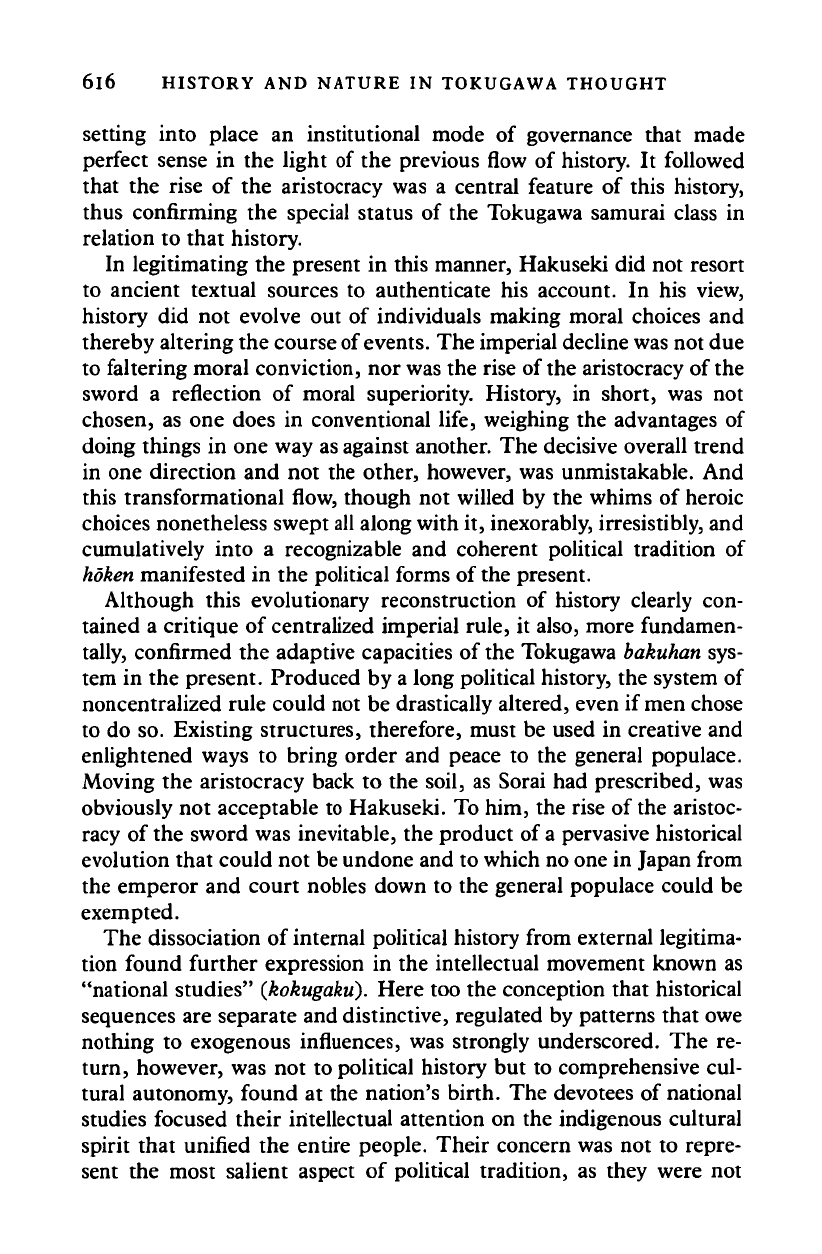
6l6 HISTORY AND NATURE IN TOKUGAWA THOUGHT
setting into place an institutional mode of governance that made
perfect sense in the light of the previous flow of history. It followed
that the rise of the aristocracy was a central feature of this history,
thus confirming the special status of the Tokugawa samurai class in
relation to that history.
In legitimating the present in this manner, Hakuseki did not resort
to ancient textual sources to authenticate his account. In his view,
history did not evolve out of individuals making moral choices and
thereby altering the course of
events.
The imperial decline was not due
to faltering moral conviction, nor was the rise of the aristocracy of the
sword a reflection of moral superiority. History, in short, was not
chosen, as one does in conventional life, weighing the advantages of
doing things in one way as against another. The decisive overall trend
in one direction and not the other, however, was unmistakable. And
this transformational flow, though not willed by the whims of heroic
choices nonetheless swept all along with it, inexorably, irresistibly, and
cumulatively into a recognizable and coherent political tradition of
hoken
manifested in the political forms of the present.
Although this evolutionary reconstruction of history clearly con-
tained a critique of centralized imperial rule, it also, more fundamen-
tally, confirmed the adaptive capacities of the Tokugawa
bakuhan
sys-
tem in the present. Produced by a long political history, the system of
noncentralized rule could not be drastically altered, even if men chose
to do so. Existing structures, therefore, must be used in creative and
enlightened ways to bring order and peace to the general populace.
Moving the aristocracy back to the soil, as Sorai had prescribed, was
obviously not acceptable to Hakuseki. To him, the rise of the aristoc-
racy of the sword was inevitable, the product of
a
pervasive historical
evolution that could not be undone and to which no one in Japan from
the emperor and court nobles down to the general populace could be
exempted.
The dissociation of internal political history from external legitima-
tion found further expression in the intellectual movement known as
"national studies"
(kokugaku).
Here too the conception that historical
sequences are separate and distinctive, regulated by patterns that owe
nothing to exogenous influences, was strongly underscored. The re-
turn, however, was not to political history but to comprehensive cul-
tural autonomy, found at the nation's birth. The devotees of national
studies focused their intellectual attention on the indigenous cultural
spirit that unified the entire people. Their concern was not to repre-
sent the most salient aspect of political tradition, as they were not
Cambridge Histories Online © Cambridge University Press, 2008
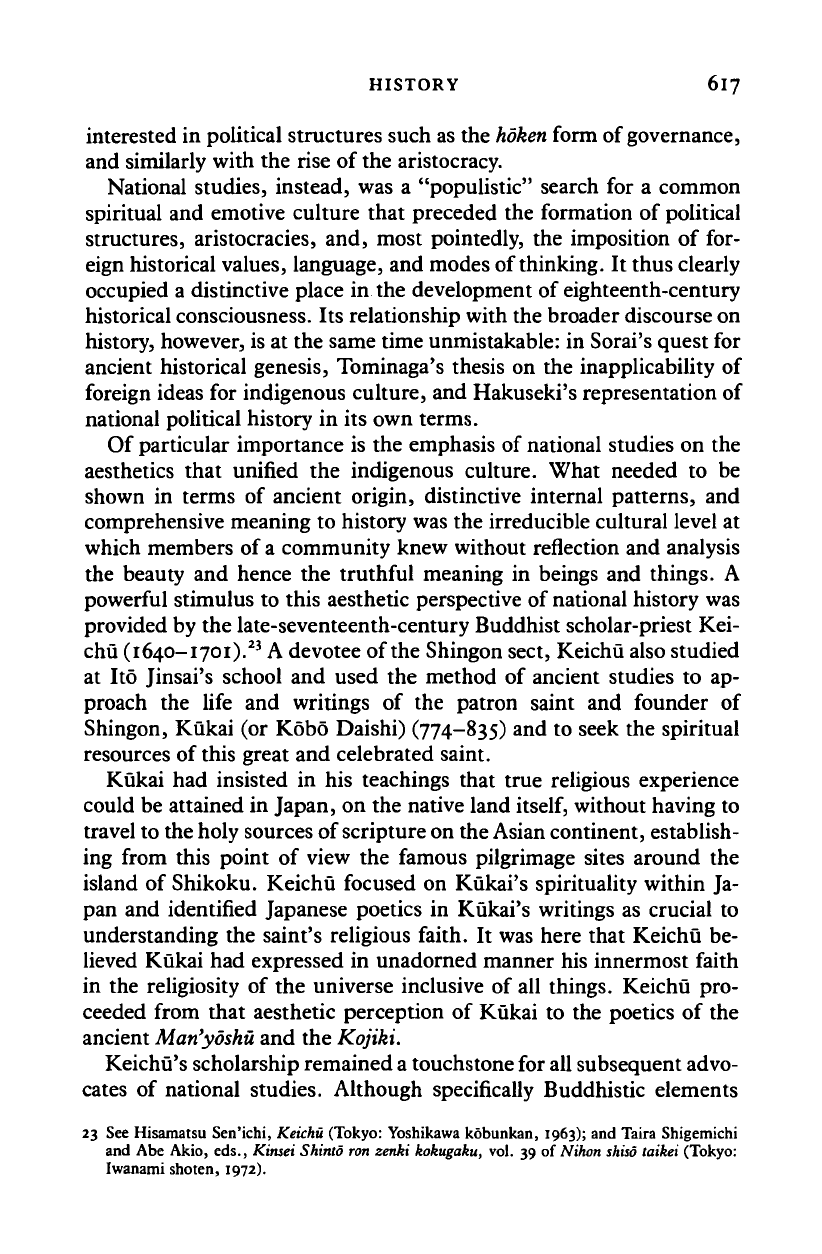
HISTORY 617
interested in political structures such as the
hoken
form of governance,
and similarly with the rise of the aristocracy.
National studies, instead, was a "populistic" search for a common
spiritual and emotive culture that preceded the formation of political
structures, aristocracies, and, most pointedly, the imposition of for-
eign historical values, language, and modes of
thinking.
It thus clearly
occupied a distinctive place in the development of eighteenth-century
historical consciousness. Its relationship with the broader discourse on
history, however, is at the same time unmistakable: in Sorai's quest for
ancient historical genesis, Tominaga's thesis on the inapplicability of
foreign ideas for indigenous culture, and Hakuseki's representation of
national political history in its own terms.
Of particular importance is the emphasis of national studies on the
aesthetics that unified the indigenous culture. What needed to be
shown in terms of ancient origin, distinctive internal patterns, and
comprehensive meaning to history was the irreducible cultural level at
which members of
a
community knew without reflection and analysis
the beauty and hence the truthful meaning in beings and things. A
powerful stimulus to this aesthetic perspective of national history was
provided by the late-seventeenth-century Buddhist scholar-priest Kei-
chu (1640-1701).
23
A devotee of the Shingon sect, Keichu also studied
at ltd Jinsai's school and used the method of ancient studies to ap-
proach the life and writings of the patron saint and founder of
Shingon, Kukai (or Kobo Daishi) (774-835) and to seek the spiritual
resources of this great and celebrated saint.
Kukai had insisted in his teachings that true religious experience
could be attained in Japan, on the native land
itself,
without having to
travel to the holy sources of scripture on the Asian continent, establish-
ing from this point of view the famous pilgrimage sites around the
island of Shikoku. Keichu focused on Kukai's spirituality within Ja-
pan and identified Japanese poetics in Kukai's writings as crucial to
understanding the saint's religious faith. It was here that Keichu be-
lieved Kukai had expressed in unadorned manner his innermost faith
in the religiosity of the universe inclusive of all things. Keichu pro-
ceeded from that aesthetic perception of Kukai to the poetics of the
ancient
Mariyoshu
and the Kojiki.
Keichu's scholarship remained
a
touchstone for all subsequent advo-
cates of national studies. Although specifically Buddhistic elements
23 See Hisamatsu Sen'ichi, Keichu (Tokyo: Yoshikawa kobunkan, 1963); and Taira Shigemichi
and Abe Akio, eds., Kinsei Shinto ron zenki kokugaku, vol. 39 of Nihon
shiso
taikei (Tokyo:
Iwanami shoten, 1972).
Cambridge Histories Online © Cambridge University Press, 2008
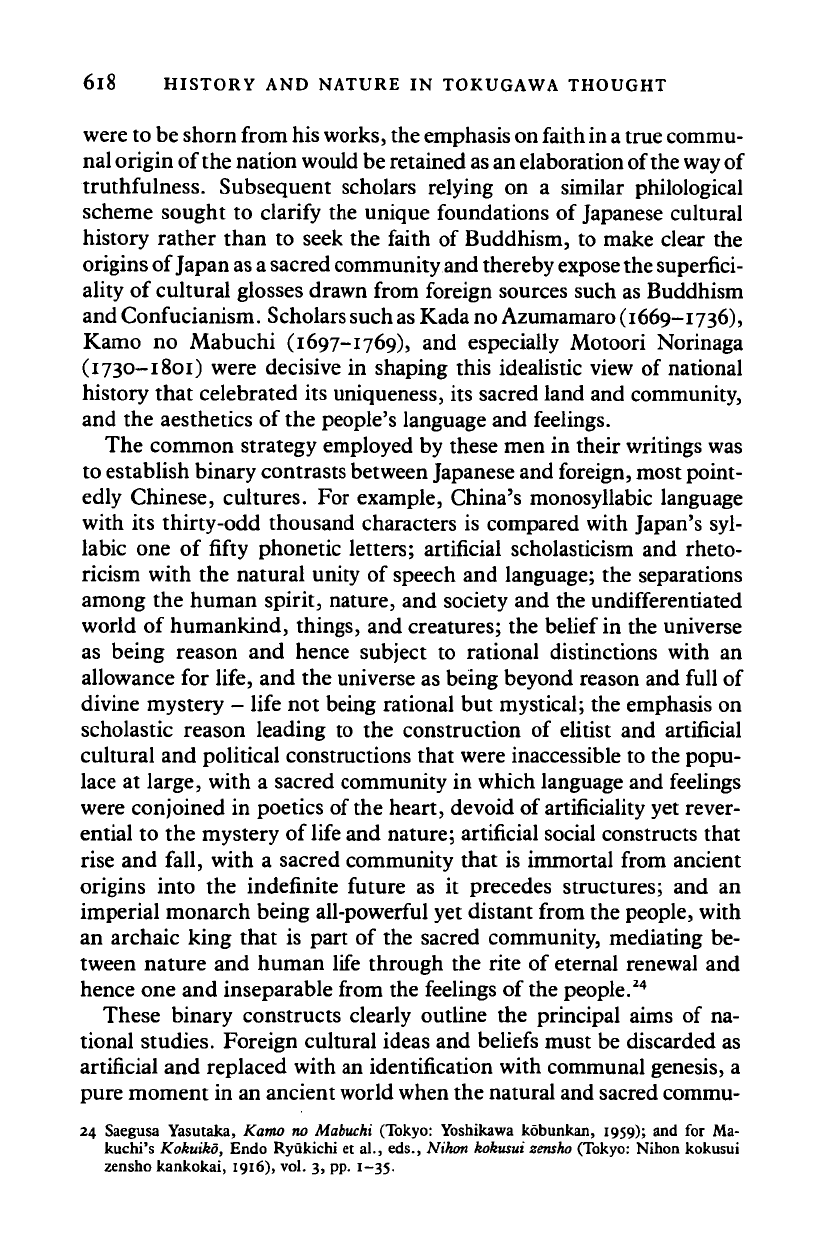
6l8 HISTORY AND NATURE IN TOKUGAWA THOUGHT
were to be shorn from his
works,
the emphasis on faith in
a
true commu-
nal origin of the nation would be retained as an elaboration of the
way of
truthfulness. Subsequent scholars relying on a similar philological
scheme sought to clarify the unique foundations of Japanese cultural
history rather than to seek the faith of Buddhism, to make clear the
origins of Japan as
a
sacred community and thereby expose the superfici-
ality of cultural glosses drawn from foreign sources such as Buddhism
and Confucianism. Scholars such
as
Kada
no
Azumamaro (1669-1736),
Kamo no Mabuchi (1697-1769), and especially Motoori Norinaga
(1730-1801) were decisive in shaping this idealistic view of national
history that celebrated its uniqueness, its sacred land and community,
and the aesthetics of the people's language and feelings.
The common strategy employed by these men in their writings was
to establish binary contrasts between Japanese and foreign, most point-
edly Chinese, cultures. For example, China's monosyllabic language
with its thirty-odd thousand characters is compared with Japan's syl-
labic one of fifty phonetic letters; artificial scholasticism and rheto-
ricism with the natural unity of speech and language; the separations
among the human spirit, nature, and society and the undifferentiated
world of humankind, things, and creatures; the belief in the universe
as being reason and hence subject to rational distinctions with an
allowance for life, and the universe as being beyond reason and full of
divine mystery - life not being rational but mystical; the emphasis on
scholastic reason leading to the construction of elitist and artificial
cultural and political constructions that were inaccessible to the popu-
lace at large, with a sacred community in which language and feelings
were conjoined in poetics of the heart, devoid of artificiality yet rever-
ential to the mystery of life and nature; artificial social constructs that
rise and fall, with a sacred community that is immortal from ancient
origins into the indefinite future as it precedes structures; and an
imperial monarch being all-powerful yet distant from the people, with
an archaic king that is part of the sacred community, mediating be-
tween nature and human life through the rite of eternal renewal and
hence one and inseparable from the feelings of the people.
24
These binary constructs clearly outline the principal aims of na-
tional studies. Foreign cultural ideas and beliefs must be discarded as
artificial and replaced with an identification with communal genesis, a
pure moment in an ancient world when the natural and sacred commu-
24 Saegusa Yasutaka, Kamo no Mabuchi (Tokyo: Yoshikawa kobunkan, 1959); and for Ma-
kuchi's Kokuiko, Endo Ryukichi et al., eds., Nihon kokusui
zensho
(Tokyo: Nihon kokusui
zensho kankokai, 1916), vol. 3, pp. 1-35.
Cambridge Histories Online © Cambridge University Press, 2008
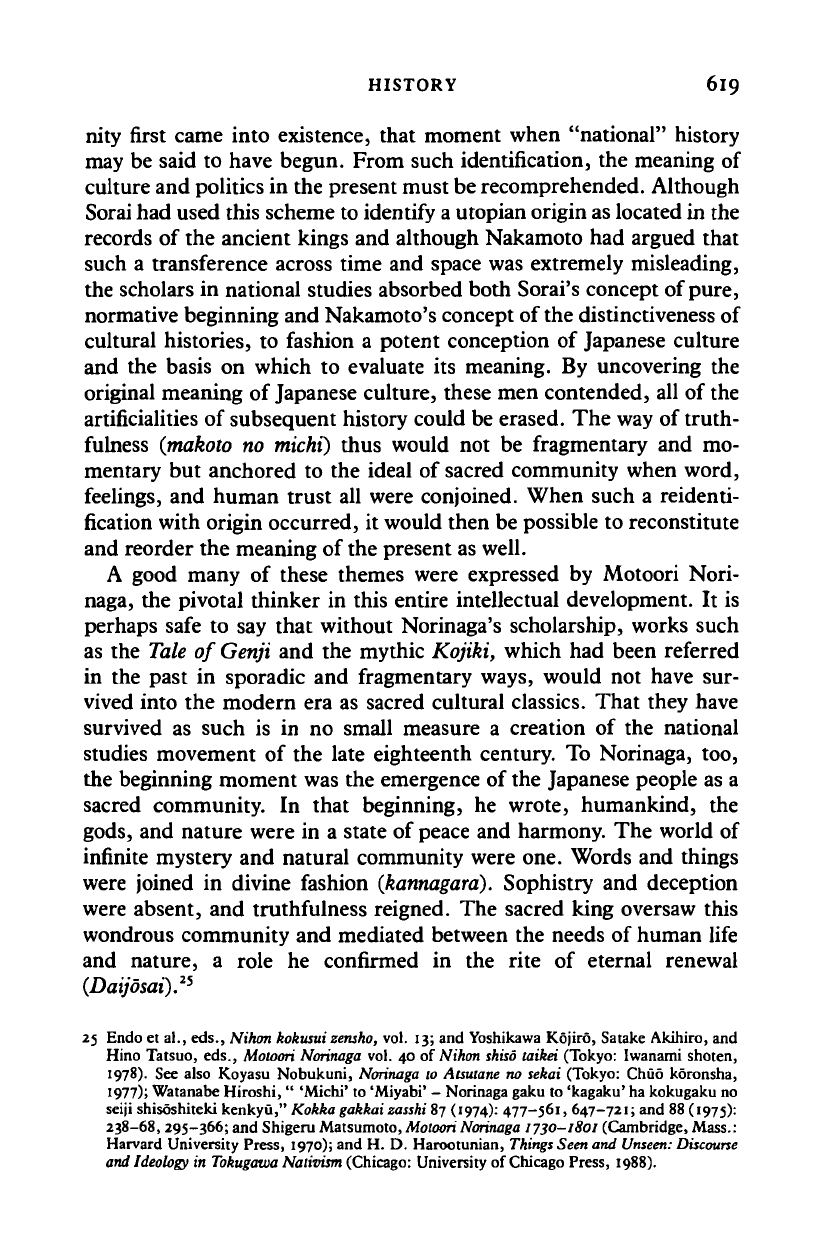
HISTORY 619
nity first came into existence, that moment when "national" history
may be said to have begun. From such identification, the meaning of
culture and politics in the present must be recomprehended. Although
Sorai had used this scheme to identify
a
Utopian origin as located in the
records of the ancient kings and although Nakamoto had argued that
such a transference across time and space was extremely misleading,
the scholars in national studies absorbed both Sorai's concept of pure,
normative beginning and Nakamoto's concept of the distinctiveness of
cultural histories, to fashion a potent conception of Japanese culture
and the basis on which to evaluate its meaning. By uncovering the
original meaning of Japanese culture, these men contended, all of the
artificialities of subsequent history could be erased. The way of truth-
fulness (makoto no michi) thus would not be fragmentary and mo-
mentary but anchored to the ideal of sacred community when word,
feelings, and human trust all were conjoined. When such a reidenti-
fication with origin occurred, it would then be possible to reconstitute
and reorder the meaning of the present as well.
A good many of these themes were expressed by Motoori Nori-
naga, the pivotal thinker in this entire intellectual development. It is
perhaps safe to say that without Norinaga's scholarship, works such
as the
Tale
of
Genji
and the mythic Kojiki, which had been referred
in the past in sporadic and fragmentary ways, would not have sur-
vived into the modern era as sacred cultural classics. That they have
survived as such is in no small measure a creation of the national
studies movement of the late eighteenth century. To Norinaga, too,
the beginning moment was the emergence of the Japanese people as a
sacred community. In that beginning, he wrote, humankind, the
gods,
and nature were in a state of peace and harmony. The world of
infinite mystery and natural community were one. Words and things
were joined in divine fashion
(kannagara).
Sophistry and deception
were absent, and truthfulness reigned. The sacred king oversaw this
wondrous community and mediated between the needs of human life
and nature, a role he confirmed in the rite of eternal renewal
(Daijosai).
25
25 Endo et al., eds., Nikon kokusuizensho, vol. 13; and Yoshikawa Kojiro, Satake Akihiro, and
Hino Tatsuo, eds., Motoori Norinaga vol. 40 of Nihon shiso taikei (Tokyo: Iwanami shoten,
1978).
See also Koyasu Nobukuni, Norinaga to Atsutane no sekai (Tokyo: Chuo koronsha,
1977);
Watanabe Hiroshi, " 'Michi' to 'Miyabi' - Norinaga gaku to 'kagaku' ha kokugaku no
seiji shisoshileki kenkyu," Kokka gakkai zasshi 87(1974): 477-561, 647-721; and 88 (1975):
238-68,295-366; and Shigeru Matsumoto,
Motoori Norinaga
1730-1801 (Cambridge, Mass.:
Harvard University Press, 1970); and H. D. Harootunian,
Things
Seen and
Unseen:
Discourse
and Ideology in Tokugawa Nativism (Chicago: University of Chicago Press, 1988).
Cambridge Histories Online © Cambridge University Press, 2008
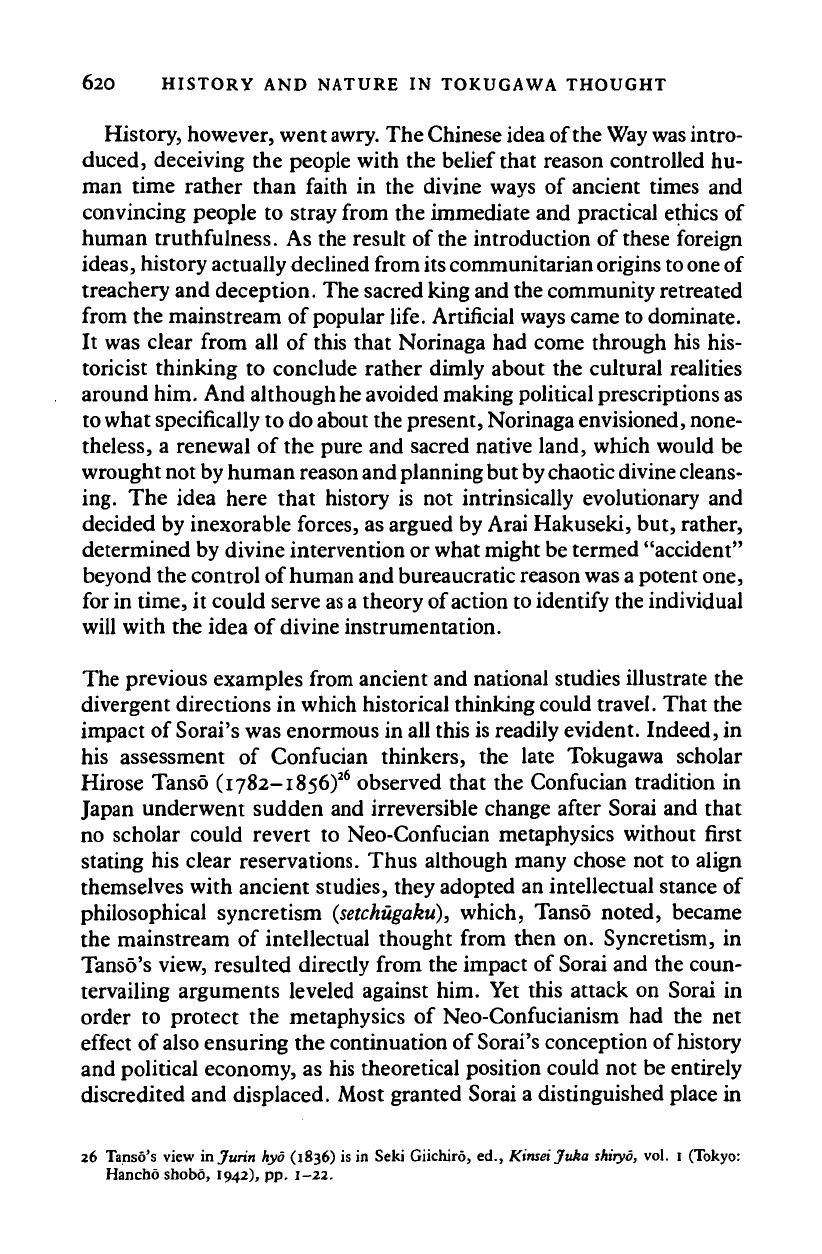
620 HISTORY AND NATURE IN TOKUGAWA THOUGHT
History, however, went
awry.
The Chinese idea of the
Way was
intro-
duced, deceiving the people with the belief that reason controlled hu-
man time rather than faith in the divine ways of ancient times and
convincing people to stray from the immediate and practical ethics of
human truthfulness. As the result of the introduction of these foreign
ideas,
history actually declined from
its
communitarian origins
to one of
treachery and deception. The sacred king and the community retreated
from the mainstream of popular life. Artificial ways came to dominate.
It was clear from all of this that Norinaga had come through his his-
toricist thinking to conclude rather dimly about the cultural realities
around him. And although
he
avoided making political prescriptions as
to
what specifically to do about the present, Norinaga envisioned, none-
theless, a renewal of the pure and sacred native land, which would be
wrought not
by
human reason and planning but
by
chaotic divine
cleans-
ing. The idea here that history is not intrinsically evolutionary and
decided by inexorable forces, as argued by Arai Hakuseki, but, rather,
determined by divine intervention or what might be termed "accident"
beyond the control of human and bureaucratic reason was
a
potent one,
for in time, it could serve
as a
theory of action to identify the individual
will with the idea of divine instrumentation.
The previous examples from ancient and national studies illustrate the
divergent directions in which historical thinking could travel. That the
impact of Sorai's was enormous in all this is readily evident. Indeed, in
his assessment of Confucian thinkers, the late Tokugawa scholar
Hirose Tanso (1782-1856)
26
observed that the Confucian tradition in
Japan underwent sudden and irreversible change after Sorai and that
no scholar could revert to Neo-Confucian metaphysics without first
stating his clear reservations. Thus although many chose not to align
themselves with ancient studies, they adopted an intellectual stance of
philosophical syncretism
(setchugaku),
which, Tanso noted, became
the mainstream of intellectual thought from then on. Syncretism, in
Tanso's view, resulted directly from the impact of Sorai and the coun-
tervailing arguments leveled against him. Yet this attack on Sorai in
order to protect the metaphysics of Neo-Confucianism had the net
effect of
also
ensuring the continuation of Sorai's conception of history
and political economy, as his theoretical position could not be entirely
discredited and displaced. Most granted Sorai a distinguished place in
26 Tanso's view in Jurin hyd (1836) is in Seki Giichiro, ed., Kinseijuka
shityd,
vol. 1 (Tokyo:
Hancho shobo, 1942), pp. 1-22.
Cambridge Histories Online © Cambridge University Press, 2008
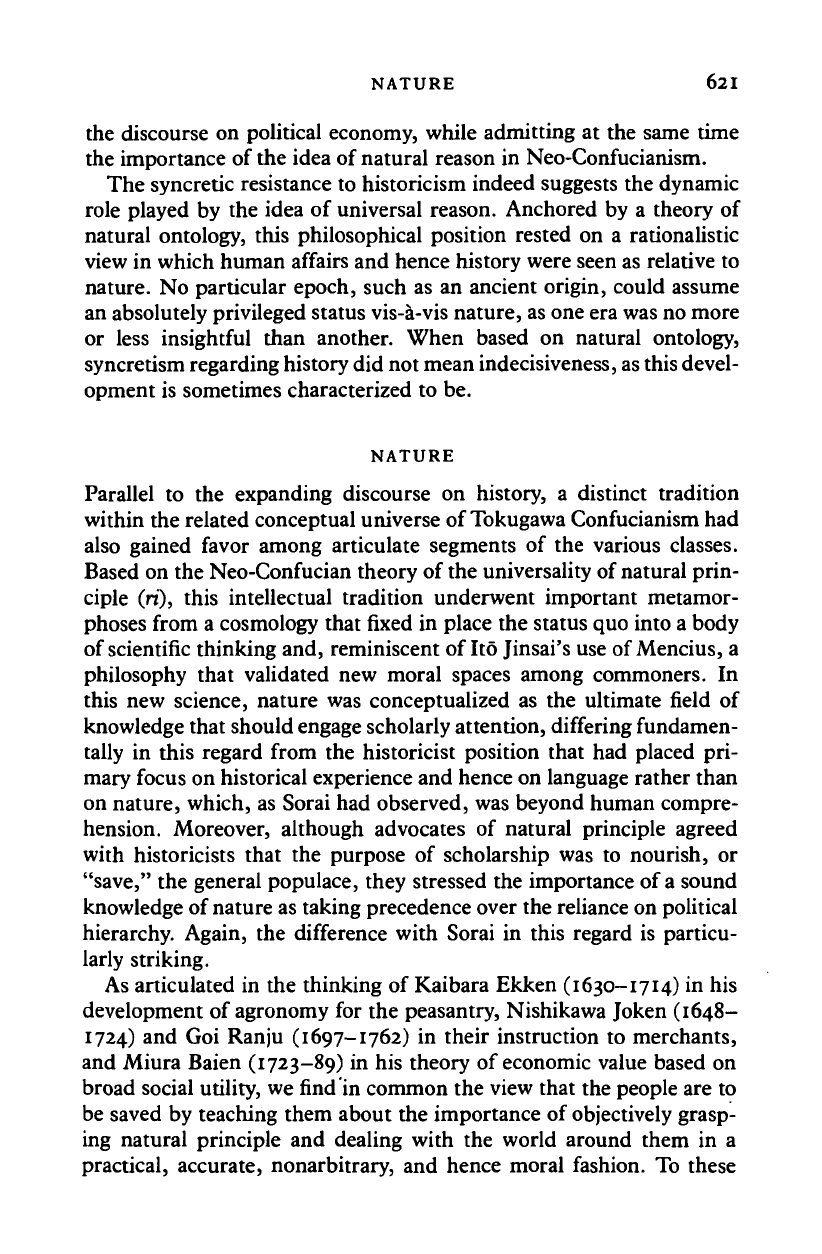
NATURE 621
the discourse on political economy, while admitting at the same time
the importance of the idea of natural reason in Neo-Confucianism.
The syncretic resistance to historicism indeed suggests the dynamic
role played by the idea of universal reason. Anchored by a theory of
natural ontology, this philosophical position rested on a rationalistic
view in which human affairs and hence history were seen as relative to
nature. No particular epoch, such as an ancient origin, could assume
an absolutely privileged status vis-a-vis nature, as one era was no more
or less insightful than another. When based on natural ontology,
syncretism regarding history did not mean indecisiveness,
as
this devel-
opment is sometimes characterized to be.
NATURE
Parallel to the expanding discourse on history, a distinct tradition
within the related conceptual universe of Tokugawa Confucianism had
also gained favor among articulate segments of the various classes.
Based on the Neo-Confucian theory of the universality of natural prin-
ciple (ri), this intellectual tradition underwent important metamor-
phoses from a cosmology that fixed in place the status quo into a body
of scientific thinking and, reminiscent of ltd Jinsai's use of
Mencius,
a
philosophy that validated new moral spaces among commoners. In
this new science, nature was conceptualized as the ultimate field of
knowledge that should engage scholarly attention, differing fundamen-
tally in this regard from the historicist position that had placed pri-
mary focus on historical experience and hence on language rather than
on nature, which, as Sorai had observed, was beyond human compre-
hension. Moreover, although advocates of natural principle agreed
with historicists that the purpose of scholarship was to nourish, or
"save,"
the general populace, they stressed the importance of
a
sound
knowledge of nature as taking precedence over the reliance on political
hierarchy. Again, the difference with Sorai in this regard is particu-
larly striking.
As articulated in the thinking of Kaibara Ekken (1630-1714) in his
development of agronomy for the peasantry, Nishikawa Joken (1648-
1724) and Goi Ranju (1697-1762) in their instruction to merchants,
and Miura Baien (1723-89) in his theory of economic value based on
broad social utility, we find in common the view that the people are to
be saved by teaching them about the importance of objectively grasp-
ing natural principle and dealing with the world around them in a
practical, accurate, nonarbitrary, and hence moral fashion. To these
Cambridge Histories Online © Cambridge University Press, 2008
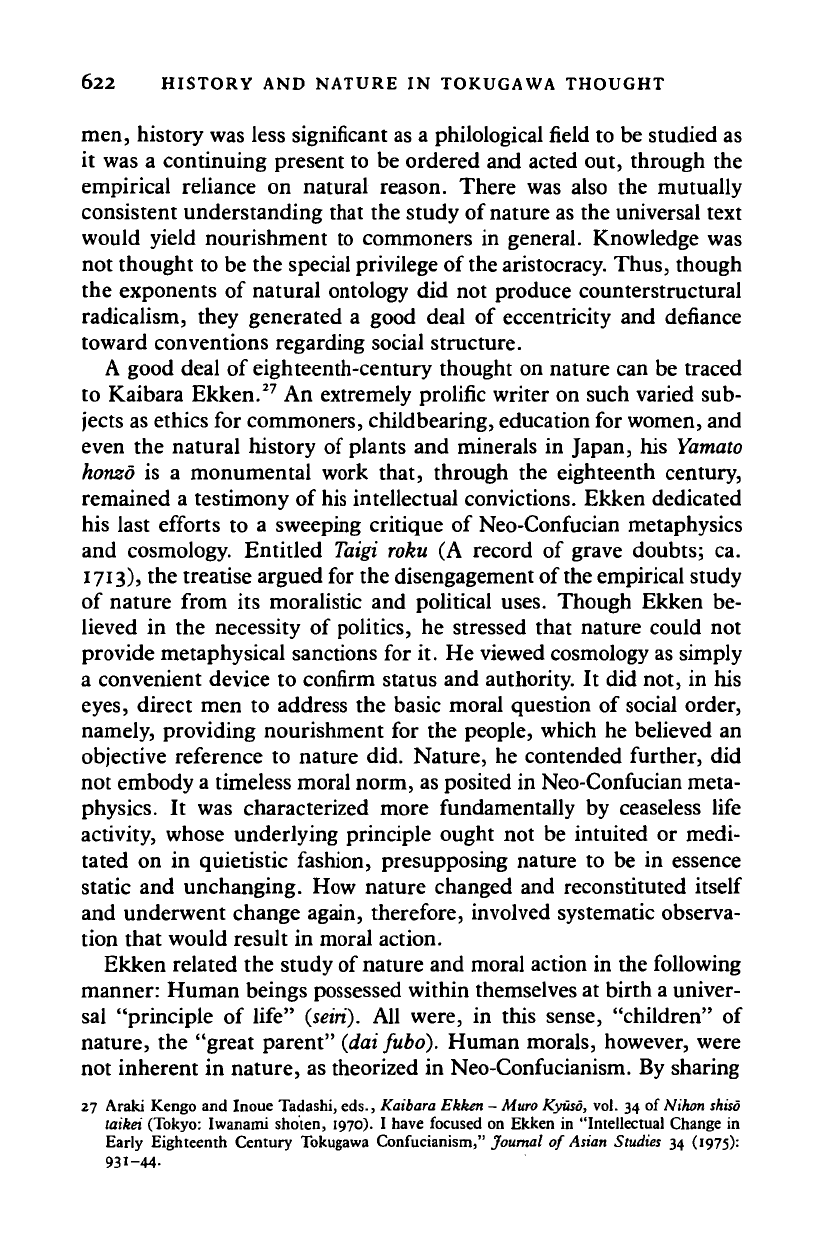
622 HISTORY AND NATURE IN TOKUGAWA THOUGHT
men, history was less significant as a philological field to be studied as
it was a continuing present to be ordered and acted out, through the
empirical reliance on natural reason. There was also the mutually
consistent understanding that the study of nature as the universal text
would yield nourishment to commoners in general. Knowledge was
not thought to be the special privilege of the aristocracy. Thus, though
the exponents of natural ontology did not produce counterstructural
radicalism, they generated a good deal of eccentricity and defiance
toward conventions regarding social structure.
A good deal of eighteenth-century thought on nature can be traced
to Kaibara Ekken.
27
An extremely prolific writer on such varied sub-
jects as ethics for commoners, childbearing, education for women, and
even the natural history of plants and minerals in Japan, his
Yatnato
homo is a monumental work that, through the eighteenth century,
remained a testimony of
his
intellectual convictions. Ekken dedicated
his last efforts to a sweeping critique of Neo-Confucian metaphysics
and cosmology. Entitled
Taigi
roku (A record of grave doubts; ca.
1713),
the treatise argued for the disengagement of the empirical study
of nature from its moralistic and political uses. Though Ekken be-
lieved in the necessity of politics, he stressed that nature could not
provide metaphysical sanctions for it. He viewed cosmology as simply
a convenient device to confirm status and authority. It did not, in his
eyes,
direct men to address the basic moral question of social order,
namely, providing nourishment for the people, which he believed an
objective reference to nature did. Nature, he contended further, did
not embody a timeless moral norm, as posited in Neo-Confucian meta-
physics. It was characterized more fundamentally by ceaseless life
activity, whose underlying principle ought not be intuited or medi-
tated on in quietistic fashion, presupposing nature to be in essence
static and unchanging. How nature changed and reconstituted itself
and underwent change again, therefore, involved systematic observa-
tion that would result in moral action.
Ekken related the study of nature and moral action in the following
manner: Human beings possessed within themselves at birth a univer-
sal "principle of life"
(seiri).
All were, in this sense, "children" of
nature, the "great parent" (daifubo). Human morals, however, were
not inherent in nature, as theorized in Neo-Confucianism. By sharing
27 Araki Kengo and Inoue Tadashi, eds., Kaibara Ekken - Muro Kyuso, vol. 34 of Nihon shiso
taikei (Tokyo: Iwanami shoten, 1970). I have focused on Ekken in "Intellectual Change in
Early Eighteenth Century Tokugawa Confucianism," Journal of Asian Studies 34 (1975):
931-44.
Cambridge Histories Online © Cambridge University Press, 2008
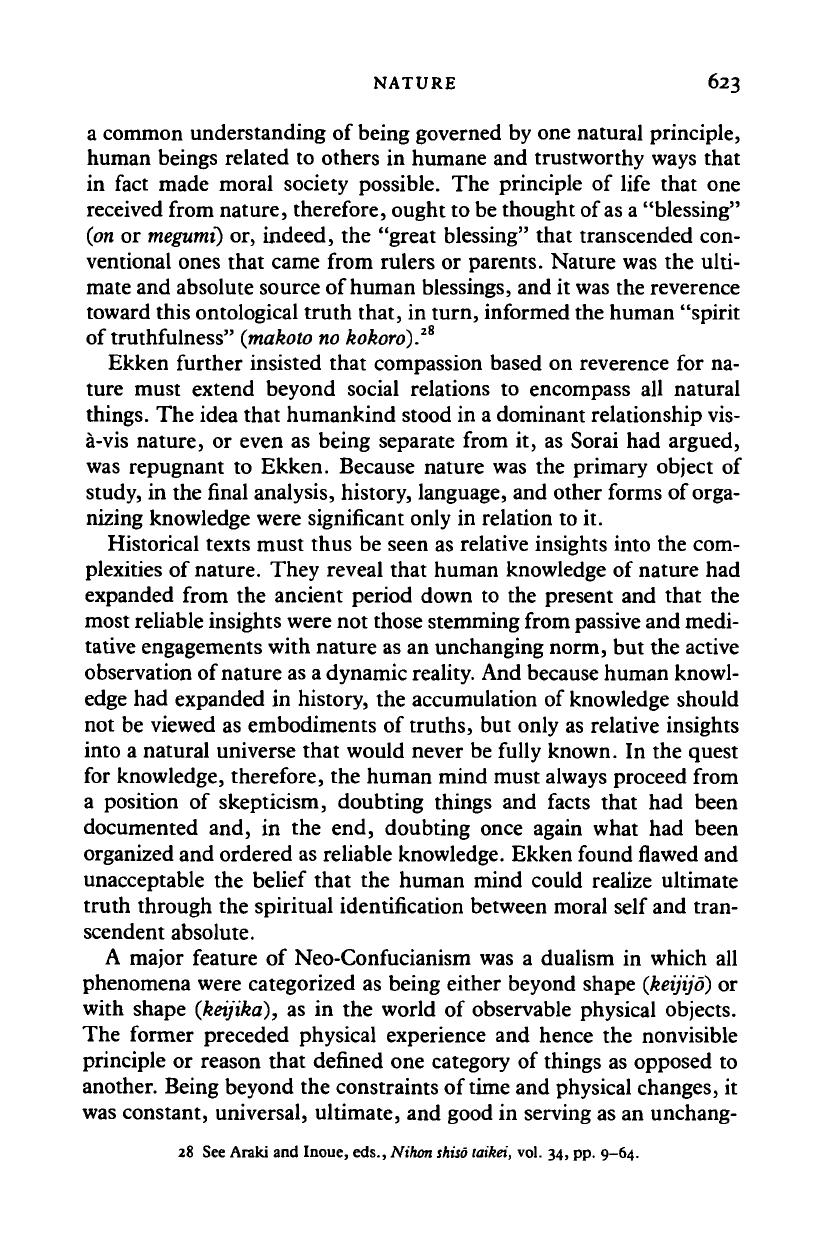
NATURE 623
a common understanding of being governed by one natural principle,
human beings related to others in humane and trustworthy ways that
in fact made moral society possible. The principle of life that one
received from nature, therefore, ought to be thought of as a "blessing"
(on
or
megumi)
or, indeed, the "great blessing" that transcended con-
ventional ones that came from rulers or parents. Nature was the ulti-
mate and absolute source of human blessings, and it was the reverence
toward this ontological truth that, in turn, informed the human "spirit
of truthfulness"
(makoto no
kokoro).
zi
Ekken further insisted that compassion based on reverence for na-
ture must extend beyond social relations to encompass all natural
things. The idea that humankind stood in a dominant relationship vis-
a-vis nature, or even as being separate from it, as Sorai had argued,
was repugnant to Ekken. Because nature was the primary object of
study, in the final analysis, history, language, and other forms of orga-
nizing knowledge were significant only in relation to it.
Historical texts must thus be seen as relative insights into the com-
plexities of nature. They reveal that human knowledge of nature had
expanded from the ancient period down to the present and that the
most reliable insights were not those stemming from passive and medi-
tative engagements with nature as an unchanging norm, but the active
observation of nature as a dynamic reality. And because human knowl-
edge had expanded in history, the accumulation of knowledge should
not be viewed as embodiments of truths, but only as relative insights
into a natural universe that would never be fully known. In the quest
for knowledge, therefore, the human mind must always proceed from
a position of skepticism, doubting things and facts that had been
documented and, in the end, doubting once again what had been
organized and ordered as reliable knowledge. Ekken found flawed and
unacceptable the belief that the human mind could realize ultimate
truth through the spiritual identification between moral self and tran-
scendent absolute.
A major feature of Neo-Confucianism was a dualism in which all
phenomena were categorized as being either beyond shape
(keijijo)
or
with shape (keijika), as in the world of observable physical objects.
The former preceded physical experience and hence the nonvisible
principle or reason that defined one category of things as opposed to
another. Being beyond the constraints of time and physical changes, it
was constant, universal, ultimate, and good in serving as an unchang-
28 See Araki and Inoue, eds., Nikon
shiso
taikei, vol. 34, pp. 9-64.
Cambridge Histories Online © Cambridge University Press, 2008
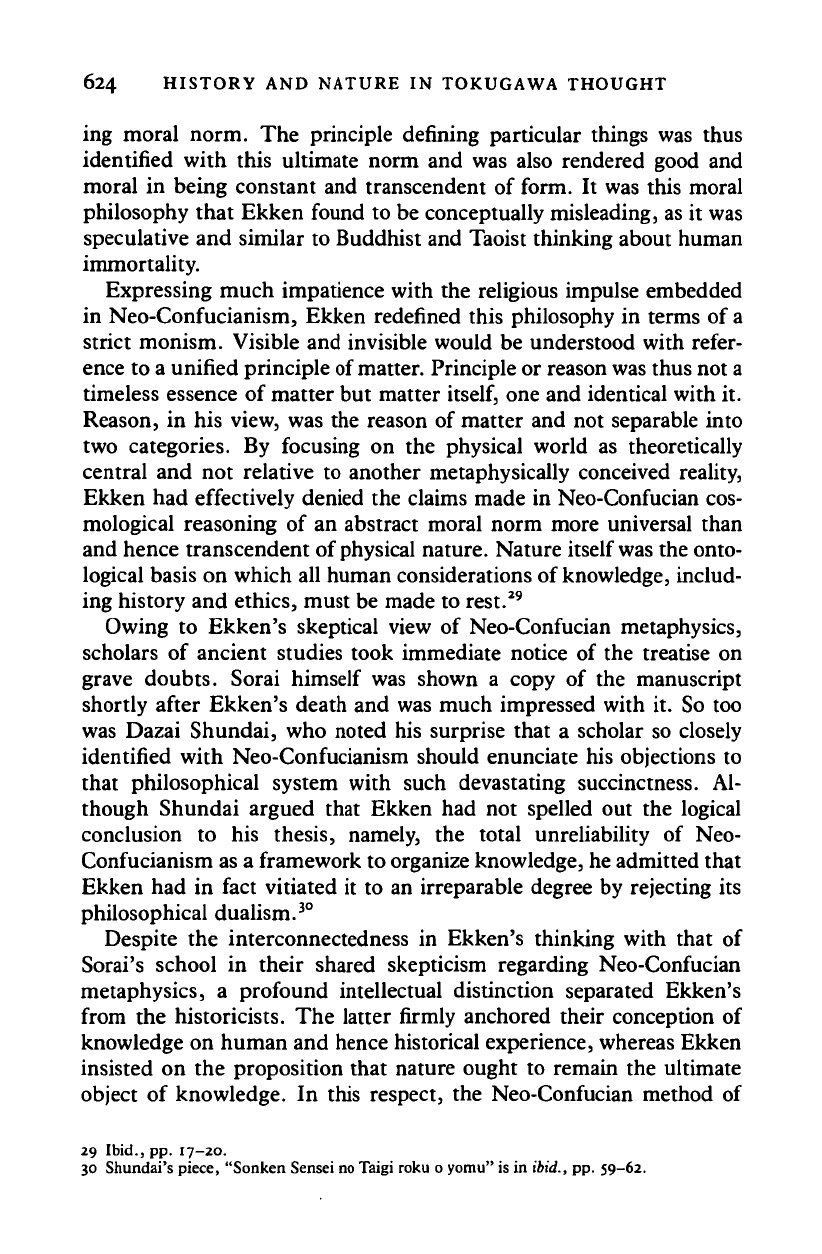
624 HISTORY AND NATURE IN TOKUGAWA THOUGHT
ing moral norm. The principle defining particular things was thus
identified with this ultimate norm and was also rendered good and
moral in being constant and transcendent of form. It was this moral
philosophy that Ekken found to be conceptually misleading, as it was
speculative and similar to Buddhist and Taoist thinking about human
immortality.
Expressing much impatience with the religious impulse embedded
in Neo-Confucianism, Ekken redefined this philosophy in terms of
a
strict monism. Visible and invisible would be understood with refer-
ence to a unified principle of matter. Principle or reason was thus not a
timeless essence of matter but matter
itself,
one and identical with it.
Reason, in his view, was the reason of matter and not separable into
two categories. By focusing on the physical world as theoretically
central and not relative to another metaphysically conceived reality,
Ekken had effectively denied the claims made in Neo-Confucian cos-
mological reasoning of an abstract moral norm more universal than
and hence transcendent of physical nature. Nature itself
was
the onto-
logical basis on which all human considerations of knowledge, includ-
ing history and ethics, must be made to rest.
29
Owing to Ekken's skeptical view of Neo-Confucian metaphysics,
scholars of ancient studies took immediate notice of the treatise on
grave doubts. Sorai himself was shown a copy of the manuscript
shortly after Ekken's death and was much impressed with it. So too
was Dazai Shundai, who noted his surprise that a scholar so closely
identified with Neo-Confucianism should enunciate his objections to
that philosophical system with such devastating succinctness. Al-
though Shundai argued that Ekken had not spelled out the logical
conclusion to his thesis, namely, the total unreliability of Neo-
Confucianism as a framework to organize knowledge, he admitted that
Ekken had in fact vitiated it to an irreparable degree by rejecting its
philosophical dualism.
30
Despite the interconnectedness in Ekken's thinking with that of
Sorai's school in their shared skepticism regarding Neo-Confucian
metaphysics, a profound intellectual distinction separated Ekken's
from the historicists. The latter firmly anchored their conception of
knowledge on human and hence historical experience, whereas Ekken
insisted on the proposition that nature ought to remain the ultimate
object of knowledge. In this respect, the Neo-Confucian method of
29 Ibid., pp. 17-20.
30 Shundai's piece, "Sonken Sensei no Taigi roku o yomu" is in
ibid.,
pp. 59-62.
Cambridge Histories Online © Cambridge University Press, 2008
